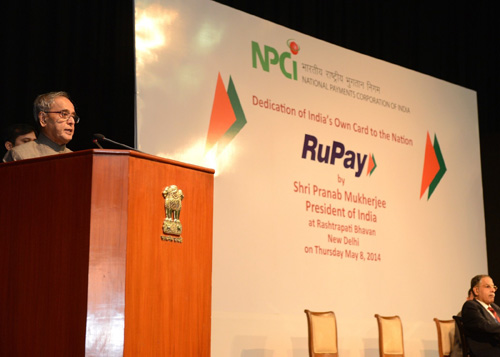Speech by the President of India, Shri Pranab Mukherjee at the Dedication of Rupay Card to the Nation
Rashtrapati Bhavan Auditorium, New Delhi : 18-05-2014
Download : Speeches ![]() (173.58 KB)
(173.58 KB)

I am indeed happy to be amidst you this afternoon for the RuPay dedication function.
2. RuPay – I am told – is the fruit of five years of hard work. It is a new service to facilitate people and organisations in the country to make payments to one another by use of a payment card instead of cash, cheques, drafts or wire transfer. I understand that India is one of the few countries in the world to have such a network built domestically to meet the card-based payment system needs of the country. I congratulate Reserve Bank of India for having envisioned the need for such an indigenously managed service in 2005 and for entrusting this task to the National Payments Corporation soon after its operationalization in 2010. I am told that it usually takes five to seven years to build a fully functional card payment network. I am happy that the Corporation could make the RuPay service operational by April 2013. Today, RuPay cards are accepted at all ATMs, more than 90 % of ‘Point of Sale’ (POS) Terminals and more than 10,000 e-Commerce merchants in the country. It is also heartening to note that a few banks have started issuing cards which are accepted internationally through the network of an international partner. The RuPay Scheme provides flexibility to card issuing banks to issue special purpose cards like Kisan Cards, Milk Procurement Cards, Grain Procurement Cards and Financial Inclusion Cards.
3. I have been briefed that the card payment system operates on a very sound four- party operating procedure uniformly adopted in all the countries in the world. The roles and responsibilities of four parties – the Issuing bank, customers, merchants and the Acquiring banks are well defined and the procedure is the same across all countries. At the centre, remains the card scheme provider like the ‘National Payments Corporation’ (NPCI) for clearing and settlement. The creativity lies in developing products meeting the special needs of the customers by the issuing banks. Once the rail roads for card payments are built, the same card can be used at ATMs for cash withdrawal or remittance transactions. The same card can similarly be used on the internet for bill payment or e-Commerce transactions.
4. For a large country like India with a rapidly growing economy, the volume of payment transactions, specially those settled through cards, will be significant in the years ahead. Transactions which are mostly settled today either by way of cash or cheque will progressively make way for card based payment transactions as the economy matures and internet penetration increases. An indigenous system like RuPay will, hopefully, not only reduce the dependence on cash and cheque modes of settlement but will also make it easier to offer products based on specific requirements of diverse user sets within the country.
5. I am told that one such innovation of RuPay is the Kisan cards issued to farmers in order to enable them to withdraw cash from any ATM without having to visit any bank branch. The card can also be used at fertilisers/farm equipment shops or for general consumption as stipulated under the Kisan card Scheme. I compliment National Payments Corporation for enabling the banks to implement the Kisan card Scheme. Seven million cards issued so far is only a fraction of the potential. Launch of milk procurement pre-paid card by milk procurement agencies or grain procurement agencies in Punjab are other such variants of the card payment mechanism which only a card payment system developed within the country can appreciate and implement faster.
6. In the light of this background, dedication of RuPay to the nation is symbolic of the maturity of the payment system development in India and contribution of the National Payments Corporation of India to nation building. I am pleased to dedicate the RuPay - our Country’s Own card, to the nation and wish it great success in the coming days.
Thank you
Jaihind !
